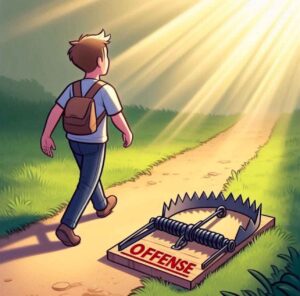Welcome Blessings!
(Tap 🔽 to see more topics!)


How not to take things personally? Consider a moment when a family member makes a seemingly offhand comment at dinner that sticks in your craw all evening. Or when a colleague doesn’t reply to your email immediately, you start wondering if you’ve done something wrong. Maybe a friend deactivated or deleted her social media accounts (without informing you, duh!), changes plans at the last minute, and a little voice inside whispers that they don’t want to hang out with you. Whether it’s overthinking the tone of a text message, feeling overlooked in a meeting, or misinterpreting a teacher’s feedback, so many daily interactions can leave most people feeling stung or questioning themselves.
In our hyper-connected world, this also spills into the online realm, where a lack of likes or misinterpreted comments can send most people with an active social media life spiraling. Most people constantly try to read between the lines and figure out what people mean, often landing on the most critical interpretation. But what if we could learn to create a little more space between someone’s actions or words and our emotional reaction?
Imagine moving through your day – at home, at work, with friends, online: with a sense of inner calm, less easily thrown off balance by the inevitable bumps in the road. Learning not to take things personally isn’t about becoming indifferent. Still, it’s about protecting your peace of mind and responding to the world from a place of strength rather than defensiveness.
People’s Words Say More About Them Than About You
Have you ever been in a mood, maybe you’re tired, stressed about work, or just feeling a bit off… and you might have snapped at someone, even if they didn’t do anything wrong? It happens to all of us. In those moments, your reaction is about what’s happening inside you, not the other person.
Words can be the same. When someone says something harsh or dismissive, it’s easy to think, “What did I do?” But often, their words spill over from their internal stuff: their bad day, their insecurities, their way of seeing the world.
Another example is when someone bumps into you and spills their coffee. You wouldn’t automatically think, “Wow, they must dislike my outfit!” You may realize they were clumsy or not paying attention. Sometimes, harsh words are their version of spilled coffee – a result of what’s going on with them, not a direct statement about you. This one simple truth can change how you process what people say and do. It helps you step back and realize that not everything is a personal attack.

You Don’t Need Everyone to Like You
This can be a tough pill to swallow, especially if you naturally want to please people. But you know what? Trying to get everyone to adore you is like chasing the wind. You can run and run, but you’ll never quite catch it.
You could be the most delicious, perfectly ripe avocado in the world, and there will still be someone who doesn’t like avocados. It’s not about the avocado being bad… it’s a matter of preference. There’s this old saying that worrying too much about what others think can trap you. But you feel more secure when you focus on being true to yourself and trusting in something bigger than people’s opinions. Your worth isn’t based on everyone else’s approval. It comes from within.
You Are Already Enough, Period.
When we get all twisted up about something someone said or did, what’s often bubbling underneath is us questioning our value. That weird look from your teammate? Maybe they were thinking about what to have for lunch! But your brain can be sneaky, turning it into a whole drama reel: “Did I mess up that presentation? Do they think I’m not good at my job?”
Seriously, it’s draining. Honestly? It’s just not true. The thing is, your worth? It’s not something that goes up and down depending on who smiles at you or who doesn’t. It’s already there, solid as a rock. You don’t need anyone else’s approval to make you valuable.
Instead of getting stuck on “Why are they acting like that towards me?“ try asking yourself, “Hmm, what might they be going through that’s making them act that way?” See how that shifts things? It takes the spotlight off you and puts it back on the other person’s potential. You know that feeling when you’ve had a rough morning and might snap at someone without meaning to? It’s not about them but it’s about your mood. Other people’s reactions are often more about their internal world than yours.
And if you find comfort in faith, there’s this beautiful idea in Psalm 139:14: “I praise you because I am fearfully and wonderfully made.” It’s like saying you were made with intention and care, not like a bunch of random parts thrown together. You’re inherently valuable just because you are.
It’s a process of letting go of taking things personally, but remembering your inherent worth is a huge first step. It’s like putting on a shield that helps those little barbs bounce right off.
Feedback Isn’t Always a Personal Attack
Hearing feedback can sometimes feel like a punch to the gut, even when people say it’s meant to help. It’s like, “Ouch, you don’t like my thing?” But sometimes, the only way to see what we’re missing is when someone else points it out. It’s like having a little mirror held up for us. Growth usually involves a little friction, like rubbing two sticks together to make fire – it might feel rough, but it can lead to something good.
Not all feedback is helpful. Sometimes, it’s more about where the other person is coming from. Maybe they’re feeling insecure, jealous, or even projecting their stuff onto you. So, how do you figure out what to take to heart and what to brush off? It’s all about being able to tell the difference.
Think of it like trying on clothes when you’re shopping. Some outfits look great on you, fit well, and feel like your style. But then there are those things that are just not right. Perhaps they’re too tight, the color doesn’t suit you, or it’s not your vibe. You wouldn’t force yourself to wear something uncomfortable, would you? Feedback can be the same. It’s okay to put it back at the rack if it doesn’t fit you or feel right.
And there’s this cool bit of wisdom that says we should be quick to listen, slow to speak, and slow to get angry. It reminds us that not every comment or feedback needs a big reaction from us. Sometimes, the best thing we can do is listen and decide what to do with it without letting it stir up a storm inside.
What You Focus On Grows
Think of your attention like a spotlight. Whatever you shine it on tends to get bigger and brighter in your mind. So, if you keep replaying that slightly awkward comment, someone made or that time you felt a little ignored, it’s like you’re watering those negative feelings. They start to take root and can cloud your whole day. Always remember that you’re the gardener of your mind! You get to decide what you give your energy to.
Below are simple ways to put this into practice when something stings a little:
Your mind is like a garden. You’ve got many things that can grow there: weeds like feeling offended, insecurity, and worry, and beautiful flowers like peace, joy, and confidence. Whatever you give your attention and energy to (what you “water”) will flourish. That being said, what kind of garden do you want to cultivate?
Not Everyone Thinks Like You
We often get tripped up and take things personally because we automatically assume everyone else sees, feels, and reacts to things the same way we do. But the truth is, everyone has their unique inner world.
Suppose you have a favorite way to solve a puzzle. You expect everyone else to approach it the same way, using the same steps. But then you realize, “Wait, they have the methods that work for them!” When you realize that everyone operates with their unique “operating system,” it becomes much easier to step back and not automatically interpret their actions through your lens. It’s surprisingly freeing to realize that their way of doing things isn’t always about you.

Offense Is a Trap
That feeling of being offended can be so tricky. It can feel justified now, like, “But, they were out of line!” But holding onto that offense? It’s like carrying around a little bag of negativity. It weighs you down and messes with your inner peace. It can even make you see things in a more negative light than they are.
Remember, “You can’t control what people say or do, but you can control how you react to it.” This idea has been around for ages, and it’s spot on: things that might rub us the wrong way are inevitable. Like that saying, “You can’t please everyone.” This old wisdom says, “You’re gonna run into situations that could offend you.” It’s just part of being human and interacting with other humans. But the key thing here is that just because those moments pop up doesn’t mean we have to grab onto that offense and let it take root in our hearts. We have a choice in how we deal with it. But what can we do in those moments?
The bottom line is that letting offense creep in can mess with your head and your heart. Learning to recognize it and handle it thoughtfully can bring a whole lot more peace to your day-to-day life.
You Can Be Sensitive Without Being Fragile
Feeling deeply about things isn’t a bad thing at all. It often means you understand other people well, pick up on vibes easily, and tune in. That’s a strength! But sometimes, it feels like everything gets to us, right? It’s like even a small comment can feel like a huge blow. That’s where the “fragile” part comes in, and it can honestly make life a lot tougher than it needs to be.
But how do we stay sensitive – keep that incredible ability to connect and care – without feeling like we’re going to break at the slightest bump? The answer is to build your emotional strength. It’s like learning to be more resilient on the inside. When challenging moments happen (and they will, because that’s life!), you learn to handle them without letting them become your whole story.
The goal isn’t to become a cold, unfeeling shield. It’s about learning to be more shield-like in processing those challenging moments so you can stay open and sensitive without getting overwhelmed. You can still care deeply, but you don’t have to let every little thing pierce you to the core.
Silence Doesn’t Automatically Equal “You’re Rejected”
Have you ever sent a text and found yourself glued to your phone, waiting… waiting… and then nothing? Or maybe you shared something online, and the silence feels like a big, echoing “meh”? It’s so easy to jump to conclusions in those moments. Our minds can be real storytellers. Often, the story we come up with is that we’ve done something wrong or that the other person doesn’t care. But take note, people have their stuff going on. Seriously…!
Now, there’s this beautiful reminder from faith: Galatians 1:10 says we should focus on what God thinks, not on getting applause from people. It’s a powerful idea because it frees us from constantly chasing approval. Try to untangle your sense of worth from whether or not someone else acknowledges you in the way you expect. You are valuable, you matter, and you are seen by the person whose opinion counts. Let’s take a breath in those moments of silence and remember that it’s rarely ever just about us.
Setting Boundaries Makes You Tougher (Not Meaner!)
Learning not to take everything to heart isn’t about becoming a doormat. Nope, not at all! The more comfortable you are in your skin, the better you get at setting healthy boundaries. What are these “boundaries” we’re talking about? Imagine them like…
Why are boundaries so crucial for not taking things personally?
Imagine a beautiful garden (that’s you!). A fence around the garden isn’t there because you hate the world outside. It protects the precious things growing inside: your peace, values, and sense of self. Setting boundaries isn’t about being cold or distant. It’s about being strong and self-aware enough to protect your inner world and engage with others in a healthier, more balanced way. When you’re not constantly feeling attacked or overwhelmed, it becomes much easier not to take things personally.

It’s often rooted in past rejection, trauma, or low self-esteem. Your brain learns to brace for judgment if you grew up being criticized or misunderstood, even when it’s not there.
Practice mindfulness. Journal your thoughts. Pray through them. Challenge your assumptions by asking, “Do I have solid evidence for this belief?”
Then, set boundaries. Taking something seriously is different from taking it personally. You can protect your peace without internalizing their poison.
Yes! Ephesians 6:12 reminds us that our battle isn’t against flesh and blood. Sometimes offense is a trap, a distraction from your calling.
Grace, friend. Growth isn’t linear. Recognizing it is already a step forward.
When discussing not taking things personally, it’s not about becoming some unfeeling robot. It’s the opposite. It’s about getting solid on the inside, like having deep roots that keep you steady no matter what winds blow your way. You become anchored in who you are, and for me personally, understanding who I am in the bigger picture has been a game-changer. Trust me, as someone who used to dissect every little comment and strive for impossible perfection, learning this has brought a level of peace that honestly feels like a huge weight lifted.
Next time you feel that familiar little pang of hurt or start replaying something in your head, pause for a moment. Take a deep breath. Take a little step back mentally. And remember these ideas we’ve talked about. You don’t have to carry that burden of other people’s words or actions as your own. That feeling of freedom? It’s totally within your reach. Try thinking about one situation this week where you might normally take something personally and see if you can apply one of these truths. You might be surprised at the difference it makes! Voila! Until next time!